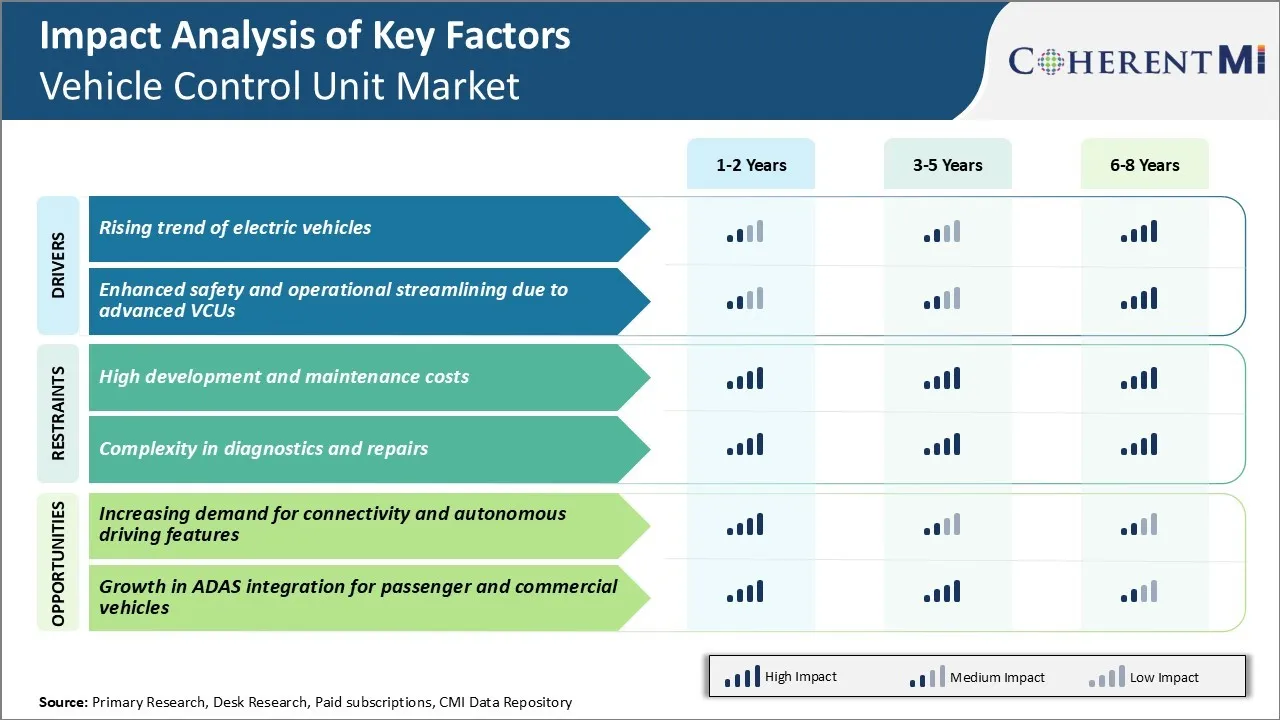Vehicle Control Unit Market Trends
Market Driver - Rising Demand for Electric Vehicles
With growing concerns over escalating pollution levels and carbon emissions from vehicles, electric vehicles are increasingly becoming popular. Growing consumer acceptance of electric vehicles is driven by lower fuel and maintenance costs over ownership period.
Fueling EVs through electricity works out much cheaper than refueling gasoline vehicles. Maintenance costs are also lower as EVs have fewer moving parts. Many developed nations have also implemented measures like free parking, exemption from road tax to make electric vehicles more attractive financially. Rising oil prices globally is making EVs a more viable alternative for individual consumers.
Many global vehicle manufacturers have accelerated their investments in electrification of vehicles with strong governmental support through policy initiatives and subsidies. Stringent emission regulations aimed at reducing vehicular pollution are forcing automakers to aggressively pursue electrification.
Vehicle components manufacturers in the vehicle control unit market are aligning themselves to cater to the electrification of vehicles by developing electronics specifically for EVs. This will primarily influence the vehicle control unit market in the coming years.
Market Driver - Enhanced Safety and Operational Streamlining Due to Advanced VCUs
Advanced vehicle control units are continually enhancing safety, comfort and convenience for vehicle occupants. VCUs facilitate new autonomous driving assistance features and active safety systems in modern vehicles. Vehicles equipped with latest generation driver assistance vehicle control units can brake automatically if an imminent collision is detected, preventing many accidents.
They are also enabling transition to higher levels of autonomous driving. They power self-driving capabilities in autonomous vehicles being developed and tested. Next generation vehicle control units will make autonomous vehicles a reality, bringing about a revolution in mobility.
Advanced vehicle control units are streamlining the driving experience with new technologies and connectivity features in vehicles. They support convenient features like wireless Apple CarPlay, android auto, and streaming apps along with integrated navigation and diagnostics. Such innovations are enhancing driver convenience and satisfaction considerably. Thereby, continued evolution of technologies will reshape mobility, driving experience, and eventually the vehicle control unit market, going ahead.

Market Challenge - High Development and Maintenance Costs
One of the key challenges faced by players in the vehicle control unit market is the high development and maintenance costs associated with these systems. Vehicle control units are complex electronic systems that require immense research and development to design innovative features and ensure optimal performance.
Continuous software and hardware updates are also required to fix bugs, introduce new functionalities, and enhance cybersecurity. This ongoing product development and maintenance translates into huge capital investments for original equipment manufacturers in the vehicle control unit market.
Additionally, vehicle control units must undergo rigorous testing and validation as any defects could seriously impact vehicle safety and lead to costly recalls. The testing procedures and certification requirements of different markets also increase the project costs substantially.
While advanced vehicle control units enable new in-vehicle experiences, high development costs put pressure on companies’ profit margins, especially in the early phases of a new product. This poses significant challenges for smaller players with limited finances to expand globally.
Market Opportunity - Increasing Demand for Connectivity and Autonomous Driving Features
One major opportunity in the vehicle control unit market is the rising demand for connected and autonomous driving technologies. As ‘Internet of Vehicles’ becomes a reality, there is increasing consumer need for always-on vehicle connectivity and seamless integration of infotainment and telematics systems. This is propelling the demand for advanced electronic control modules that support features like remote diagnostics, over-the-air software updates, telematics services and innovative digital cockpits.
Furthermore, the development of self-driving vehicles is bringing vehicle autonomy to the mainstream. To enable autonomous capabilities, control units must have powerful onboard computing ability along with interfaces for a wide range of sensors and actuators.
The growing importance of vehicle control units in emerging applications like connected services and advanced driver-assistance systems provides lucrative business opportunities for companies with expertise. OEMs are aggressively working on introducing semi-autonomous and autonomous vehicles, which will further accelerate the demand for upgraded vehicle control units in the coming years.